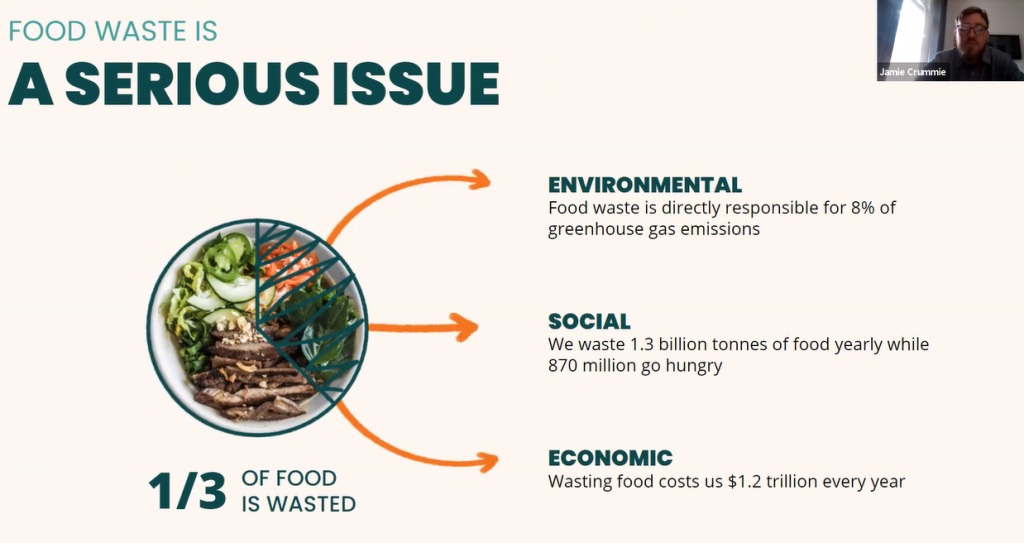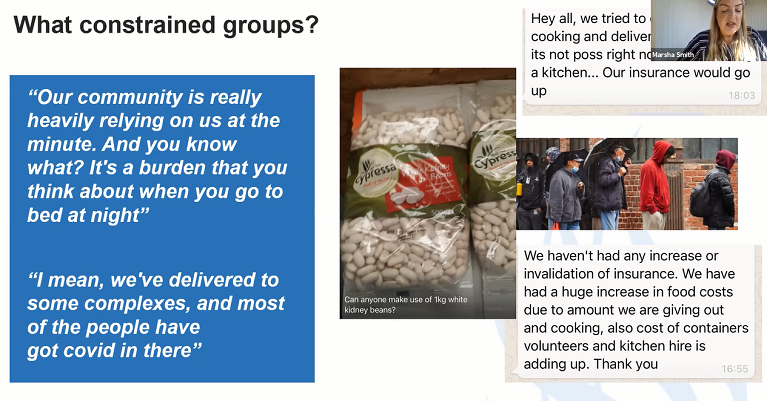By Dr. Jordon Lazell, Marsha Smith and Dr. David Bek from the Centre for Business in Society.
On the 8th and 9th of September 2021 the second ‘Future of Food Symposium’ was hosted online by the Centre for Business in Society, at Coventry University. The event engaged a range of stakeholders from businesses and society, including academics, local government representatives, community-based organisations and food industry professionals to present, discuss and devise what a more sustainable, and resilient, food system looks like.
The symposium was a timely event given the increasing precarity that COVID-19 has brought to many people’s livelihoods and lifestyles, even in the world’s wealthier nations where weaknesses in food supply chains and socio-economic fault lines have been brutally exposed. With current patterns of global production and consumption considered to be unsustainable, transforming food supply chains is essential if food systems are to meet the future needs of people and the planet. The challenge of identifying a roadmap to a more resilient, equitable and sustainable food system set the scene for the 2021 Future of Food Symposium.
Headlines from our keynote speakers
The symposium was opened by Zarah Sultana, MP for Coventry South. Zarah is a vocal advocate for tackling food poverty. For Zarah, going from recovery to resilience means ensuring good decent quality food for everyone where food is not a luxury, but a universal right.
The symposium featured four fantastic keynote speakers. Anna Davies, Professor of Geography, Environment and Society at Trinity College Dublin, presented a ‘manifesto for sustainable food sharing futures’. Discussing the findings from the Share City project, Anna explained the importance of exploring contemporary forms of food sharing. Such activities are making important contributions towards the pathway to more sustainable urban food systems.

Jamie Crummie, Co-founder of the food-sharing app Too Good To Go, presented a powerful message that tackling food waste must be the focus of climate change tackling efforts. The third keynote speaker was Professor Moya Kneafsey. Her keynote speech focused on bringing to the table the concept of territorial food systems and their importance to the future of food. The final keynote speaker, Suzanne Higgs, Professor at the University of Birmingham focused on how eating together affects food consumption.
The event also offered the opportunity to highlight innovative research undertaken by Centre for Business in Society researchers. Marsha Smith presented research undertaken in partnership with Fareshare Midlands which demonstrated the extraordinary adaptability and resourcefulness of community food groups during the course of the pandemic. The research team presented a short video documenting ‘behind the scenes’ footage which illustrated the complexities of getting surplus food to people in need within communities during this incredibly challenging time.

Overall, the symposium featured 6 tracks comprising paper presentations and 3 practitioner panel debates, covering several important topics which included:
- The importance of food sharing to facilitate a sustainable food agenda within communities
- The role of technology in tackling food waste
- The behind the scenes ‘reality’ of community food provisioning
- The role of territory and place, diversity and circularity in progressing towards more sustainable food systems
- The importance of certification and reporting to translate sustainability messages into practice
The key outcomes of the Symposium
Four major themes emerged from the Symposium:
- Firstly that whilst fantastic work is being undertaken to try to build more resilience in the food system, the socio-political structures that underpin how we access and consume food are shifting and continue to shift.
- Secondly that those working in the community food sector and beyond are exhausted and need more structured and robust support going forward.
- Thirdly the participants believe that key policy decision makers are insufficiently informed about the realities on the ground and that research needs to be communicated more effectively to those in power at different levels.
- Fourthly that this is a critical time to consider the future of food. An array of challenges are building a perfect storm threatening to pull apart the global food ecosystem. Therefore, multi-disciplinary research and collaboration with practitioners is critical.
Overall, the symposium was a great success in providing a vibrant, engaging and critical space for discussing how the food system is being re-shaped by the pandemic and thinking through what needs to happen to ensure a more resilient future. The Centre for Business in Society look forward to continue working with our partners and collaborators as we hand over the reins for the organisation of the ‘Third Future of Food Symposium’ next year.
More information about the Future of Food Symposium, including access to the full programme and the post-event report, can be found on the website – http://futurefoodsymposium.uk/




Comments are disabled